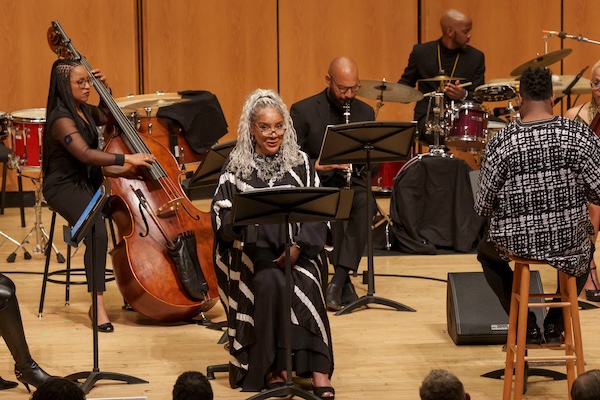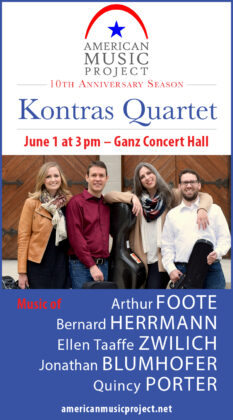Rashad adds star power to Gateways Festival’s Chicago debut

On Monday night, a healthy crowd packed into Pick-Staiger Concert Hall at Northwestern University. They came for chamber music, yes, but most of the enthusiasm and applause made it clear that they really came for Phylicia Rashad.
The concert opened the Gateways Music Festival, celebrating its 30th year overall with its debut in the Chicago area. The festival connects and supports classical musicians of African descent; while centered in Rochester, New York, at the Eastman School of Music, the initiative has branched out to New York City, Washington, D.C., and now Chicago.
The program paired Stravinsky’s The Soldier’s Tale, in the chamber suite version, with Wynton Marsalis’s A Fiddler’s Tale, a work that duplicates the instrumentation and scenario of Stravinsky’s, using a riff on the same deal-with-the-devil story while modernizing the story’s setting and the music’s idiom.
The Soldier’s Tale was introduced by the Gateways Chamber Players’ bassoonist, Monica Ellis. She specified that the musicians would be playing the chamber-suite version—i.e. no Rashad—and gave a precis of the story the speaker tells intercut with the music in the full version.
The story-shorn playing that followed was first-rate. The opening movement, “The Soldier’s March,” kicked off with clarity and angularity, the dissonances showing characteristic Stravinskyan nonchalance. The ensemble jelled remarkably well, with precise entrances and good balance where the brass never swallowed up the bassoon. The musical ideas were always boldly outlined, especially in the evil circus music of the “Triumphal March of the Devil” and in the dadaist insistence on repeated phrases and rhythms that runs throughout the piece. Even more remarkably, the players managed this level of ensemble without a conductor.
Deserving of special recognition, the economical and panache-filled playing of violinist Tai Murray, a Chicago native, brought sparkle to her many soloistic turns, especially in the difficult “Dance of the Devil.”
The players all seemed to be having a good time, especially bassist Patricia Weitzel’s jamming on some of the proto-jazz licks. All of them found enough humor in the blats and slides to get the audience to chuckle in the spaces between movements.
Then came the second half of the concert. Upon walking out on stage, Rashad, dressed dramatically in black and white and with a cascade of gray hair, received copious applause, some audience members even standing. Rashad, still probably best-known for her role as the patient and successful mother Clair Huxtable on The Cosby Show, is conveniently in town directing the play “Purpose” with Steppenwolf Theatre Company.
If The Soldier’s Tale clicked along in the first half, A Fiddler’s Tale soared, powered by Rashad’s enthralling delivery. Like the best audiobooks, Rashad’s voice transformed instantaneously as she swapped characters, from an ingenuous peal for the musician Beatrice Connors to a low growl for BZB, the devil who brings her fame and fortune at the cost of her self-respect.
Also for the musicians, if they were having a good time in the first half, they were having a great time in the second. A few times, the texture would jump from a Stravinsky-like jaggedness to a jazzier jaggedness when the percussion and bass jumped in, and all the players visibly changed their postures to put some extra sauce in the new groove. The conductor Damien Sneed capably led the musicians in the Marsalis.
Marsalis’s score frequently echoes Stravinsky’s, not only in the near-identical titles of the movements, but also in the instrumentation. He does, however, call for a periodically brighter spotlight on single instruments, jazz-combo style, giving the brass players some wah-wah opportunities and unleashing the percussionist for a drum solo right at the close of the piece. These solos came off polished and energetic, showing impressive versatility in weaving in and out of neo-Classical and jazz textures.
At first it seemed like a misfire not to have Rashad perform the narration for the Stravinsky as well as the Marsalis, even though doing so might make the concert a little long. In retrospect, though, to see quite an accomplished first half segue into the brilliant second half proved excellent showmanship, and the move injected extra vitality into Marsalis’s savvy and entertaining take on Stravinsky’s original.
The Gateways Music Festival runs through Friday. gatewaysmusicfestival.org
Posted in Performances




